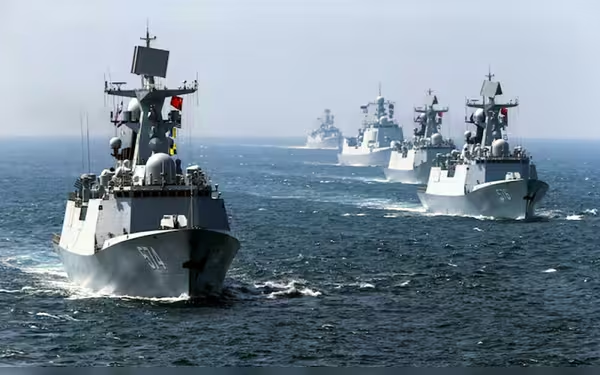Saturday, November 16, 2024 07:43 PM
China Conducts Military Drills in South China Sea Following US Talks
- China initiates military drills in disputed South China Sea.
- Wang Yi and Blinken discuss reducing regional tensions.
- Australia and Philippines enhance military collaboration with allies.
 Image Credits: brecorder
Image Credits: brecorderChina conducts military drills in the South China Sea after US talks, raising regional tensions and highlighting ongoing territorial disputes.
In recent developments, China has initiated military drills in the South China Sea, a region that has long been a hotspot for territorial disputes. This action comes shortly after high-level discussions between Chinese Foreign Minister Wang Yi and U.S. Secretary of State Antony Blinken aimed at reducing tensions in the area. The South China Sea is not just a body of water; it is a crucial maritime route that holds significant economic and strategic importance for several nations, including China, the Philippines, and Vietnam.
The Chinese military announced that their air and naval forces are conducting exercises in a disputed area, specifically around the Scarborough Shoal, which is located about 200 kilometers from the Philippines. This area is particularly contentious due to its rich fishing resources and strategic location. Despite the Permanent Court of Arbitration ruling in 2016 that dismissed China's extensive claims over the South China Sea, Beijing continues to assert its dominance in the region.
During the recent military drills, the Southern Theatre Command of the People’s Liberation Army stated that the exercises would include “routine” early warning and reconnaissance activities. They emphasized their commitment to defending national sovereignty and maintaining peace in the South China Sea. However, the lack of detailed information about the drills raises concerns among neighboring countries.
In a related context, Australia and the Philippines have announced joint maritime activities with Japan, New Zealand, and the United States within the Philippines' exclusive economic zone. This collaboration highlights the growing military presence of allied nations in the region, which some view as a counterbalance to China's assertive actions.
Wang Yi's discussions with Blinken included a focus on avoiding conflict and improving communication between the military forces of the two nations. Blinken expressed concerns regarding China's “dangerous and destabilizing actions” in the South China Sea, while Wang urged the U.S. to refrain from provoking tensions in the area. This exchange underscores the delicate balance of power in the region and the need for diplomatic dialogue.
As military activities intensify, it is essential for all parties involved to prioritize peaceful resolutions and open lines of communication. The South China Sea is not merely a geopolitical chessboard; it is home to millions of people whose livelihoods depend on its waters. The international community must advocate for cooperation and understanding to ensure that this vital region remains stable and secure for future generations.













